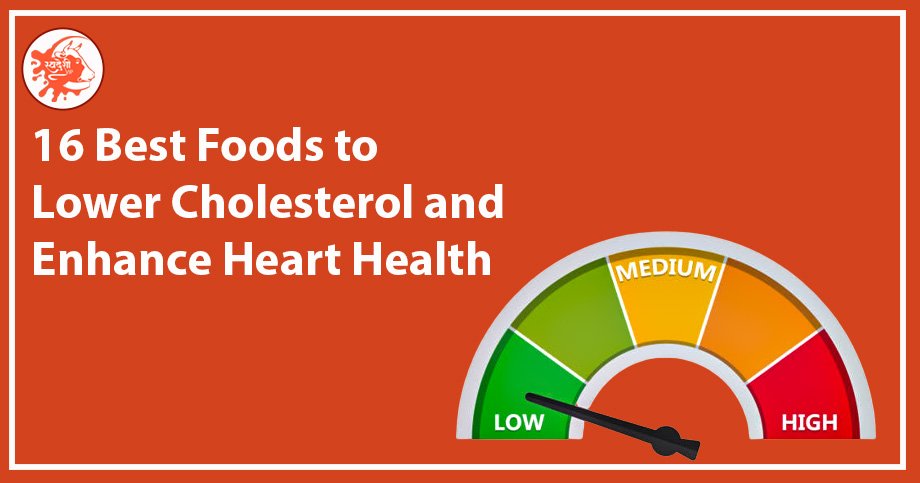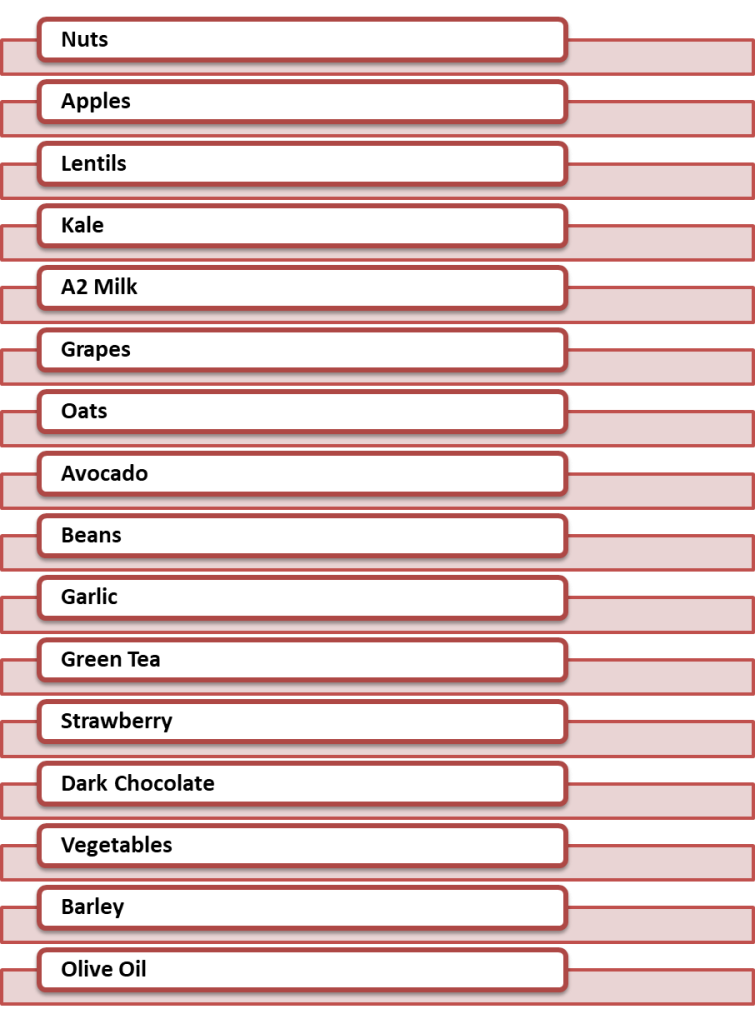
The total number of deaths due to cardiovascular diseases has witnessed an increase at an alarming rate. About 17.9 million lives succumb to death due to heart-related ailments every year. Elevated levels of cholesterol are linked with an increased risk of cardiovascular disorders. It’s important to prepare a list of the best foods to lower cholesterol and boost heart health.
Cholesterol is a fat-like substance waxy in nature. Your body produces it. Also, it is present in various foods. As good cholesterol plays a significant role in metabolic processes, it is essential for the body. However, not all cholesterol is good. Low-density Lipoprotein (LDL)[1] cholesterol is bad. It must be eliminated and reduced up to a great extent as it may give birth to life-threatening heart diseases.
In order to keep cholesterol levels at the toe and improve the functioning of the heart, taking care of the diet plan is crucial. This write-up will open your eyes regarding the best foods to lower cholesterol and help you transform your diet chart as well.
Bringing changes in the daily diet course can keep bad cholesterol under control. Here, we are going to shed light on healthy & nutrient-dense foods to lower cholesterol.

Several studies have proved that the consumption of peanuts, walnuts, almonds, as well as other nuts may turn out to be beneficial for heart health. Monounsaturated fats are present in walnuts and peanuts. Also, they provide Phytosterols and plant compounds. The structure of Phytosterols resembles cholesterol and works as an effective treatment against high cholesterol levels as they restrict its absorption in the intestines. Walnuts also entail Omega-3 fatty acids that are considered as a blessing for the heart. The trio of Magnesium, Potassium, and Calcium in nuts keeps bad cholesterol at bay. Daily intake of these nuts will reduce bad cholesterol levels and provide strength to the heart.
According to the research published a few years back in the American Journal of Clinical Nutrition, consuming two apples daily will ensure a reduction in cholesterol levels. Also, you might have heard the saying in your school books, an apple a day keeps the doctor away. This saying is applicable in the current scenario as well. A small study was conducted in 2019. 40 participants with a mild increase in their cholesterol levels consumed two apples a day and witnessed a reduction in their total & LDL cholesterol levels. Besides this, their levels of triglycerides also went down. Polyphenols in apples are helpful in reducing levels of cholesterols.
It’s a known fact that lentils are sky-high in protein and fibre. One serving a day of lentils will give you a sense of fullness. The presence of fibre is beneficial for reducing bad cholesterol levels. Thus, regular consumption may prevent heart-related ailments. Consuming it won’t let cholesterol get absorbed into the bloodstream. Consuming 60 g of lentil sprouts daily will lead to a significant decrease in triglyceride levels and keep cholesterol levels under check.
It stores a wide range of significant nutrients such as fibre, calcium, potassium, and folate that improve heart health quickly and naturally. Also, it is full of antioxidants and minerals. It’s a preventive measure for heart-related issues. It is proven that consuming Kale juice for about 12 weeks can increase good cholesterol and restrict the increase of bad cholesterol levels.
Omega-3 fatty acids are present in A2 milk produced by Indian-origin cows such as Sahiwal, Gir, Rathi, Tharparkar, Badri, etc. Daily consumption of A2 milk provides a significant boost to the heart. A2 Beta-casein protein present in A2 milk reduces the risk for heart-related diseases. Besides its advantageous properties for the heart, this form of dairy goodness boosts immunity, controls high BP, improves liver functioning, promotes quick digestion, etc.
Grapes are awesome fruits that make you crave more pieces. Aren’t they? Well, these grapes are beneficial for good health & well-being if consumed in a planned way. It entails polyphenols that reduce cholesterol and minimizes the chances of cardiovascular diseases. The presence of Potassium and Fibre in it makes it a healthy mate for the heart. As it suppresses the atherosclerosis process, it provides protection against heart-related ailments.
Consistent consumption of oats for a period of 4-5 weeks may lower down the cholesterol level and leave less scope for the occurrence of heart-related issues. 70 g of oats provides 3 g of soluble fibre. It is one of the significant foods to lower cholesterol due to the presence of soluble fibre. In the realm of health, it’s deemed as a heart-healthy diet.
One serving of avocado meets the body’s requirements of 20% of the daily suggested fibre intake. As per the research conducted, it may reduce risks associated with heart disease by 30% as it won’t let cholesterol levels increase and also regulates high BP. The combination of monounsaturated fatty acids, dietary fibres, polyunsaturated fatty acids, and a wide range of nutrients present in Avocado plays a substantial part in maintaining heart health.
Loaded with the goodness of minerals and fibre, beans are a vital part of a heart-healthy diet & lifestyle. Its regular consumption may bring improvement in levels of cholesterol. Besides reducing cholesterol levels, it lowers blood pressure as well, thanks to the presence of folate, magnesium, and antioxidants in it.
Researchers have ascertained that garlic is beneficial in regulating cholesterol levels. Furthermore, its daily intake plays a key role in keeping blood pressure under control. It is used in numerous dishes and offers several health benefits.
It is packed with antioxidants such as Catechins. Daily intake of green tea is linked with decreased cholesterol levels, reduced triglycerides and weight loss, thereby minimizing the chances of heart-related ailments.
It is one of the significant antioxidant-rich foods to lower cholesterol. This seasonal fruit acts as a catalyst in lowering cholesterol levels. It entails a substantial amount of folic acid, potassium, iodine, etc. The mix of these elements controls the growth of bad cholesterol and aids in weight loss. Your heart deserves this amazing fruit.
Cocoa in dark chocolate encompasses flavonoids. A group of compounds found in vegetables & fruits are known as flavonoids. Consumption of dark chocolate hinders an increase in cholesterol levels and, thereby, prevents the risk of cardiovascular diseases.
A good heart requires good diet support. Vegetables are a considerable part of a heart-friendly diet. They comprise antioxidants, fibres, different types of vitamins, and minerals. Pectin-rich vegetables, such as potatoes, carrots, peas, tomatoes, etc., are beneficial for sound heart health.
It belongs to the category of healthy grains. Vitamins, minerals, and fibres present in it enhance its value. A form of soluble dietary fibre, beta-glucan, found in barley, is good for lowering cholesterol. Also, it provides additional health benefits.
Monounsaturated Fatty Acids in olive oil make it a healthy source of fat. It reduces the chance of cardiovascular disease. In the current scenario, several families prefer using it in their food. The reason is its anti-inflammatory properties. Also, it is considered healthy for the heart.
It’s important to reduce the intake of foods that entail elevated levels of Saturated and Trans fats. Given below are some significant foods that are considered bad for cholesterol and may increase its level-
In some other articles, we will discuss foods bad for cholesterol in detail.
High cholesterol levels may lead to severe cardiovascular ailments in the future. Thus, lowering it will give relief to your heart and increase your life expectancy as well. Make a change in your food consumption pattern and live a wholesome life. You might have learnt the best foods to lower cholesterol. To increase your knowledge related to health & wellness trends, keep reading SwadeshiVIP blogs.
Read our Article: 20 Health Benefits of Buttermilk (Chaas): An In-depth Overview
